| Srl | Item |
| 1 |
ID:
113712
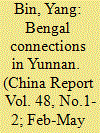

|
|
|
|
|
| Publication |
2012.
|
| Summary/Abstract |
Yunnan, a southwestern frontier province in China is located in mainland Southeast Asia and is inhabited by diverse cross-regional ethnic groups. This essay attempts to reveal the Bengal connections in historical Yunnan from the medieval age to the early modern period through a scrutiny of Chinese and certain non-Chinese sources. It first discusses the use of cowry currency in Yunnan and other areas around the Bay of Bengal, and then constructs historical routes linking the Bengali world and Yunnan, both by land and sea. Furthermore, the spread of Buddhism into Yunnan is highlighted to demonstrate Bengali cultural influence. The Bengal connections in Yunnan hence, shed some light on both historical Yunnan and the formation of Chinese frontiers.
|
|
|
|
|
|
|
|
|
|
|
|
|
|
|
|
| 2 |
ID:
113713
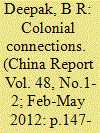

|
|
|
|
|
| Publication |
2012.
|
| Summary/Abstract |
Relying on primary sources in India and China, especially British intelligence reports, this essay attempts to reconstruct colonial era linkages between the two countries from 1905 to 1930. In the first section, the essay examines the connections that Indian nationalists and revolutionaries had with leading Chinese nationalists such as Sun Yat-sen and Zhang Taiyan in Japan and mainland China, and their attempts to devise strategies to dislodge the British from India through armed struggle. This part also discusses the support and sympathy of the Chinese nationalists for the Indian people and the Indian cause. The second section deals with the nature of Ghadar activities in various centers across China such as Hong Kong, Shanghai, Hankou, Nanjing and Beijing and posits that during the initial phase (1913-18), Ghadar activists acted independently and tried to enlist the support of the Chinese nationalists and Germans to procure arms and ammunition for overthrowing the British in India. During the second phase, however, owing to the Bolshevik revolution and the First United Front between the Communists and Nationalists in China, Ghadar activists began vying for the support of both Chinese parties. They were successful in this regard and in turn supported the campaign against the warlords, and even offered their services for the national cause of China. This essay argues that Ghadar nationalists played a pioneering role in uniting the peoples of China to support the fight for Indian independence. Even if much of our information about these national heroes is obtained through British intelligence reports, which are far from comprehensive, let alone objective, it still tells us a great deal about an era in which the revolutionaries of India and China extended helping hands towards each other.
|
|
|
|
|
|
|
|
|
|
|
|
|
|
|
|
| 3 |
ID:
113716
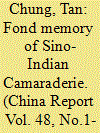

|
|
|
| 4 |
ID:
113709
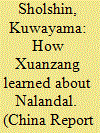

|
|
|
|
|
| Publication |
2012.
|
| Summary/Abstract |
While the Chinese monk Xuanzang's travels in South Asia are well known, the reason why he decided to make Nalanda his main destination has not been previously examined in detail. This article focuses on the early history of the Nalanda University, the South Asian monks from Nalanda who were active in China during the sixth and seventh centuries, and how Xuanzang may have come to know about the renowned educational institution in India through the works of these South Asian monks and their disciples. The article also tries to clarify the possible date of Xuanzang's departure for India.
|
|
|
|
|
|
|
|
|
|
|
|
|
|
|
|
| 5 |
ID:
113706
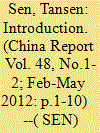

|
|
|
| 6 |
ID:
113714


|
|
|
|
|
| Publication |
2012.
|
| Summary/Abstract |
This paper examines Kang Youwei's perception of India as well as his impact on the Chinese discourse on India during the late Qing and Republican periods. The analysis is pursued on the basis of a letter entitled 'A letter to Liang Qichao and other students on [the fact that] the Fall of India [as an independent country] was due to the Independence of Its Provinces'. Kang wrote this letter to Liang, his closest student and associate who was also a famous intellectual, when Kang was in Darjeeling in May 1902. Kang was keen to diagnose India's collapse to British colonialism for the purpose of helping China avoid a similar fate. This essay argues that his journey to and writings about India were of great significance in shaping the modern Chinese perceptions of India. He, for the first time, explicitly made a comprehensive comparison between China and India and positioned India as a negative example for the Chinese. From then on, India's image among many Chinese intellectuals was that of a failed nation unable to confront imperialism.
|
|
|
|
|
|
|
|
|
|
|
|
|
|
|
|
| 7 |
ID:
113715
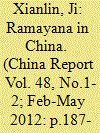

|
|
|
| 8 |
ID:
113717


|
|
|
| 9 |
ID:
113710


|
|
|
|
|
| Publication |
2012.
|
| Summary/Abstract |
This article first traces the reception history of Xuanzang's 'Record of the Western Regions' (Xiyu ji). It shows how the text was translated and used by Western scholars in the nineteenth century and used as a source for the positivist discovery of India's Buddhist past, how it became romanticised and 'spiritualised', as it were, through popularisation. This seems to have parallels in East Asian history and in the modern reception in Asia. The problem with all these attempts of interpretation lies in a decontextualisation of the text, and the last part of the article attempts to show on the basis of three case studies how the Xiyu ji should be read in a broader and-I would claim-deeper contextualising way.
|
|
|
|
|
|
|
|
|
|
|
|
|
|
|
|
| 10 |
ID:
113707
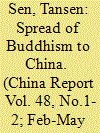

|
|
|
|
|
| Publication |
2012.
|
| Summary/Abstract |
Recent studies have significantly altered the ways in which the early history of Buddhism in China and the Buddhist interactions between ancient India and China were perceived. The accepted views about the route of the initial transmission of Buddhist doctrines, the early method of rendering Buddhist ideas into Chinese and the notion of a decline of Buddhism in China after the eighth century have all come under scrutiny. Using these analyses and arguments, this essay attempts to reassess some of the key issues concerning the spread and successful establishment of Buddhism in China. In particular, it re-examines the contribution of India-China interactions to these processes and argues that the diffusion of Buddhism in China was an outcome of multi-ethnic collaborations and the ingenuity of Chinese and foreign monks in making the doctrine adaptable to Chinese society.
|
|
|
|
|
|
|
|
|
|
|
|
|
|
|
|
| 11 |
ID:
113708
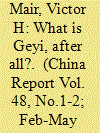

|
|
|
|
|
| Publication |
2012.
|
| Summary/Abstract |
The term geyi is often rendered as 'matching concepts' and held to be a key means for the transmission of Buddhism from India to China. It is said to be a translation technique whereby Buddhists borrowed Taoist terms to express Indian ideas in Chinese. This study thoroughly debunks that notion, demonstrating that geyi was actually a very short-lived attempt to deal with numbered lists that came to China from India in great profusion during the early medieval period, and that the current misunderstanding of the true nature of geyi is purely a matter of modern scholarship.
|
|
|
|
|
|
|
|
|
|
|
|
|
|
|
|
| 12 |
ID:
113711


|
|
|
|
|
| Publication |
2012.
|
| Summary/Abstract |
By discussing Yixing's effort to recast a ma??ala of an Indian origin (originally described in the Mahavairocana sutra [Sutra of Great Sun]) by virtue of a Chinese cosmological framework known as jiugong Palaces'), this article provides a case study of how some Buddhist ideas and practices were Sinicised when they were brought to China, particularly through Buddhist translations.
|
|
|
|
|
|
|
|
|
|
|
|
|
|
|
|